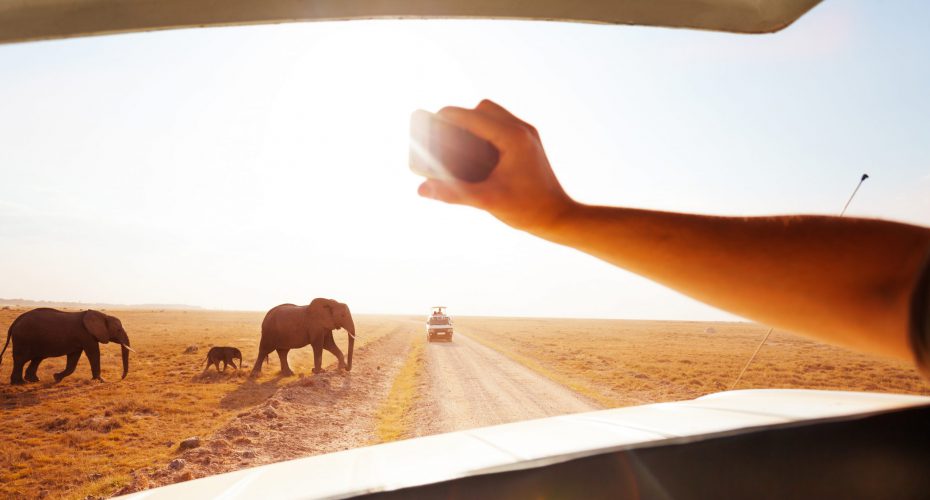 One of the best things about going on safari is leaving the hubbub of your daily life behind and truly immersing yourself in nature. The vibrations you sense should come from the rumbling stomach of an elephant, not the phone in your back pocket.
One of the best things about going on safari is leaving the hubbub of your daily life behind and truly immersing yourself in nature. The vibrations you sense should come from the rumbling stomach of an elephant, not the phone in your back pocket.
But while we love the “tech-free” aspect of a safari, we understand that teenagers may break out in hives at the thought of no social media and life at home does continue while you’re away having fun – so here are the best ways to keep in touch while you’re away.
Using your cell phone in Africa
Two-thirds of Africans are thought to own cell phones, and cell signals are available in most major towns and cities, though coverage can be patchy in the bush.
Call your provider to ensure your phone will work in your intended destination and that international roaming is enabled, but be aware that they may charge exorbitant fees even for a quick call or a text. Instead, most larger companies like AT&T, Sprint, T Mobile and Verizon have special international packages that you can sign up for in advance. Specify the countries you are traveling to, ask for details on rates and find out if it will cost extra for your friends and family to call and text you.
In general, most of South Africa – including the Kruger National Park – has good cell coverage and Kenya, Uganda and Rwanda are generally well connected. It’s trickier to find a signal in the more remote parts of Botswana, Zambia, Zimbabwe and Namibia.
Going Local
If you’re only planning to use your phone for emergencies or a quick call or two, you could buy a pre-paid phone card or a local sim card, which provides you with a local phone number and can be topped up with credit as you need it. Your phone will need to be unlocked – check with your provider in advance.
If you know you’ll be making daily calls you can rent a phone – either in the US before you depart with a company like Cell Hire or once you’re in Africa. You can hire an unlocked local phone and buy a sim card.
Using Wi-Fi
The cheapest and safest way to ensure you don’t run up a large phone bill is to turn off your cell data roaming before you get to your destination and stick to Wi-Fi instead.
Some camps have good Wi-Fi, but usually connectivity will be slow and intermittent – you’ll be able to check emails or send the odd text but not much else; wait to upload your photos until you get home. Note that some camps are deliberately off-grid, so check in advance if it’s a vital requirement for you to be online.
If you have a decent internet connection, using Skype is a cheap and easy way to stay in touch with friends and family. You can also use Skype to call someone’s cell phone or land line, which is very useful because you don’t have to wait for your receiving party to get online. The reception is very clear and it’s cheaper than any international phone plan out there.
WhatsApp is a popular app for staying in touch – using it to text uses up very little data and if you have a wi fi connections, you can make calls on WhatsApp as well.
More Tips on Staying Connected
- Keep all your electronic gadgets on airplane mode and/or no-roaming to avoid extra costs and draining your battery. Practice how to do this before you leave. If you don’t know how to, ask any 13-year-old and they will figure it out in seconds
- Bring the right adapters to recharge your phone/tablet. There’ll be sockets for charging your phone in your room/tent or the lounge/dining areas
- Set up a web-based email account if you haven’t already – such as Gmail – to make it easy to access your emails.
- If your cell phone does not work despite your best efforts, don’t panic. Every safari camp or lodge, no matter how remote, will have a cell phone or satellite phone at their base that works in emergencies. Leave a detailed itinerary of your trip with someone at home, along with contact numbers (including the international dialing code) and they will be able to reach you.
A word on etiquette
Many people choose to use their time on safari as an opportunity for a digital detox, so be mindful of their enjoyment too. Here are a few (often unspoken) rules about using the internet on safari.
- If Wi-Fi is only accessible in the lounge/dining area, don’t turn it into your office. If you do need to make or receive calls, try to do it away from other guests and put your phone on airplane mode during meals and social times
- Leave your phone behind while on game drives or other safari-based activities, or set it on airplane mode or do not disturb if you’re using it to take photos. Nothing will disrupt the tranquillity of the African bush more so than a call with Auntie Madge at full volume
- Let friends or family know that you’ll be away and may take longer than usual to get back to them. Switch your phone off, use an out of office reply on your e mail and make the most of the opportunity to immerse yourself in the sounds, sights and smells of the bush instead!
